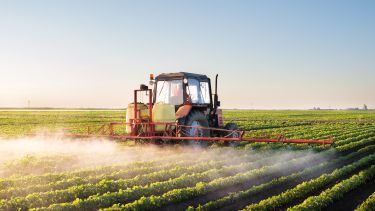- Researchers have proposed possible solutions to both the food security and climate change emergencies through agricultural technology.
- The team have explained how improvements in agriculture can deliver increased food production and at the same time make a major contribution to climate change mitigation through capture of atmospheric CO2.
- The research explains how cultivating high-yielding crops with advanced practices can give enhanced food production and create space for alternative land uses that further carbon sequestration.
- The authors identify genetic engineering, breeding, soil engineering, agronomic and biomass use technologies to achieve the above.
Scientists have proposed a range of technological options for sustainable, productive and resilient agriculture, which provide multiple routes for removing CO2 from the atmosphere to directly mitigate climate change.
The team, led by Professor David Beerling, Director of the Leverhulme Centre for Climate Change Mitigation at the University of Sheffield and Professor Steve Long, at the University of Illinois, proposed transformations of land management and agronomic practices including innovative amendments to soils, crop management and land use to promote atmospheric CO2 removal.
The research, published in Nature Plants, proposes that innovative technologies and new crop varieties, with increased photosynthesis and resource-use-efficiency, can maximally exploit agronomic practices and soil amendments to enhance carbon storage as well as food crop yields.
Sustainable yield increases in crops made possible by genomic and genetic engineering technologies could create more space for alternative land uses that further increase carbon storage, including managed afforestation, rewilding or biomass crops as feedstocks for biodegradable materials and bioenergy. Pilot and demonstration projects are now needed to test and begin implementation of these advances.
Agricultural reforms have often focused on the trade-offs between climate change mitigation and food production. The new research offers a different perspective on how agriculture can deliver global food security through increased productivity and at the same time make a major contribution to climate change mitigation through capture of atmospheric carbon dioxide.
Agriculture is a major contributor to climate change and current practice could undermine efforts to meet the Paris climate change targets.
At the same time, a growing human population, with changing dietary preferences, is driving ever increasing demand for food, and climate change threatens to cause decreased production. The need for urgent reform is widely recognised and addressed with a number of ambitious plans, which have as their cornerstones changes in diet and reducing food waste.
Transformations of land management and agronomic practices are required to address food security and climate change. We propose a set of innovative technologies and steps involving amendments to soils and crops, and changes in land use, to simultaneously increase soil fertility, and sequestration of atmospheric CO2
Professor David Beerling
Director of the Leverhulme Centre for Climate Change Mitigation from the University of Sheffield
Professor Steve Long, from the University of Illinois, said: “Sustainable yield increases in crops made possible by genomic and genetic engineering technologies could create more space for alternative land uses that further increase carbon storage, including managed afforestation, rewilding or biomass crops as feedstocks for biodegradable materials and bioenergy. But careful analysis is needed to discover which approach can deliver the greatest climate change mitigation in the shortest time.”

